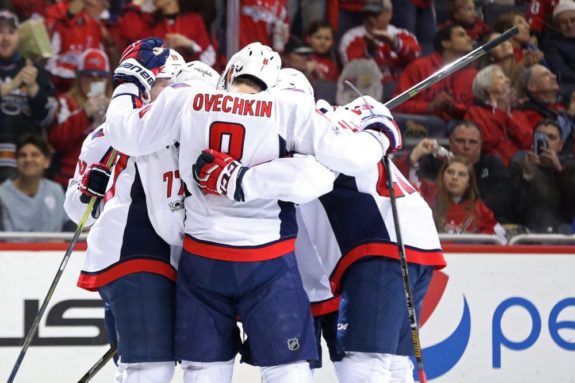Here we go again. It’s the first round of the Stanley Cup playoffs, and Alexander Ovechkin and his Washington Capitals appear to be struggling. Having dominated the regular season yet again and with the Toronto Maple Leafs in the first year of a long-term rebuild, this should have been an easy start for the Capitals. As a team that has a history of playoff failure, they made it very clear they were all in this season, Stanley Cup or bust.
They went out of their way to win the Kevin Shattenkirk trade sweepstakes and are as deep as ever up front. How could they possibly have been down two games to one to the lowly Toronto Maple Leafs through three games? Is there something head coach Barry Trotz should do to engage his players and get his stars more involved? He seems to think so, and told TSN about it.
Superstar goal-scorer Ovechkin is averaging well under 20 minutes of time on ice (TOI) per game. That’s somewhat surprising considering the first three games went to overtime. In the overtime loss of Game 3, Ovechkin had 15:08 TOI. By comparison, T.J. Oshie played 18:37. Many think working Ovechkin into the game a little more may have given them the edge they needed to score that extra goal and put the games away in regulation. To counter that, here are some fun Ovechkin career playoff facts.
Sprinting in a Marathon
Heading into the 2016-17 playoffs, the Capitals’ captain played 84 total playoff games for his career. He racked up 41 goals and 41 assists for 82 playoff points. Being nearly a point-per-game player in the playoffs over almost a decade is remarkable. It’s one of the main stats cited as proof it’s not his fault the Capitals can’t make it past the second round. He’s seemingly so consistent, but consistency is in the eye of the beholder.

In his first six series (37 games), he averaged 1.0 points per game (PPG) or better in every one of them. He was held scoreless in just eight games (21.6 percent). He was also never held scoreless more than twice in any one series. Over the next seven series (47 games), he averaged 1.0 PPG in only one of them, the 2016 Eastern Conference semifinal against the Pittsburgh Penguins, and was held pointless 23 times (48.9 percent). His total playoff PPG average is somewhat front-loaded, and the games where he scores have been fewer and farther between in recent years.
Many Hands Make Light Work
In 55 career playoff non-elimination games prior to 2016-17, Ovechkin was held scoreless 20 times (36.4 percent). In 29 elimination games, he was kept off the score sheet 11 times (38.0 percent). Again, that’s individually quite consistent. In these 11 scoreless games, the Capitals as a team were 3-8.
In the 18 elimination games when Ovechkin did register a point, the Capitals went 9-9. That does make it seem like the team lives and dies by Ovechkin. Curiously though, in games where Ovechkin was held pointless and had over 20:00 TOI, the Capitals put up a 4-18 record. When he went pointless but played less than 20 minutes, they went 7-3. This suggests the team can survive very well even when Ovechkin doesn’t factor in the scoring, as long as he isn’t taking opportunities away from his mates.
Even including games when he did score, in elimination games where he played less than 21 minutes TOI, the team was 8-6. When he logged more than 21:00, they dropped to 4-11. When his ice time went up into his customary 23-minute range, the Capitals were an atrocious 1-8. Conversely, at 17 minutes or less for Ovechkin, his team went a perfect 3-0.

Laying It All Out There
In Game 7s specifically, the Capitals are 3-6 with Ovechkin. In the four regulation losses, he averaged a ridiculous 25:06 TOI and put up 3 goals and 2 assists, but went home empty-handed. He also lost twice in Game 7 overtime, playing over 23 minutes in both of those contests. In his three career Game 7 wins, he played less than 17 minutes twice and got to move on to the next round.
The argument could be they play him less in games where they already have leads and play him more when they’re down and need a goal, but this includes an overtime Game 7 where he played 16:25 total TOI in the victory. It’s not like they were saving him with the game well in hand.
In fact, of his 84 playoff games up to this season, Ovechkin’s team was down after the second period in 26 of them, completing the comeback for a win only four times. When he played 20 minutes or more, the team comeback record was 1-20. With less than 20:00 for their leader, the Capitals overcame a 40-minute deficit three times out of five.
Focusing only on the more realistic chances when they were down by just one goal heading into the final frame, when he played less than 20 minutes they were 3-3, and when he played more than 20 minutes they were a big goose egg next to nine losses. It would seem overplaying Ovechkin doesn’t consistently lead to team success in the first two periods and is extremely detrimental to any comeback attempt late in the game. Once he hits 21:00 and they’re down in the third, they’re just as well putting Tom Wilson on the ice as Ovechkin.
Slow and Steady Wins
Playing Ovechkin consistently from period to period is actually critical to the playoff fate of the Capitals. In 60 playoff games where he had a recorded variance of greater than one minute TOI from period to period, the Caps were 25-35. Of these games, when Ovechkin averaged more than 20 minutes they fell to 6-30. In games where Number 8 played less than 20 minutes and had less than a one-minute deviation from period to period, they were 11-2.

What about when power-play time significantly contributed to ice time variation beyond his control? You would think giving a sure bet like Ovechkin more playing time, especially on the power play, would naturally lead to more wins. That’s true, but only if he’s well regulated in five-on-five time. In playoff games where the Capitals had between four minutes and 10 minutes of power play time and Ovechkin had over 23 minutes total ice time as a result, they went one win and seven losses.
Imagine. The greatest goal scorer in the galaxy plays over 23 minutes, sometimes with almost half of that on a man-advantage, and he goes 1-7. Not surprisingly, in the other nine games with four minutes or more of power play time, Ovechkin’s TOI stayed below 21 minutes and he led his team to an 8-1 record.
Lesson Learned
History seems to show that picking moments with Ovechkin is much better for the team in the long run. The 2016-17 regular season was no exception. With 20 minutes or more to his credit in 17 games, Ovechkin’s Presidents’ Trophy-winning Capitals were 4-9-4. He tallied just six points and was held scoreless 76.5 percent of the time. Trotz smartly didn’t make a habit of that. He held Ovechkin to less than 20 minutes 65 times and had a 51-10-4 record to show for it. Ovechkin himself jumped up to a 0.95 PPG average (62 points) and was only held scoreless at his typical 34 percent rate.
He played less than 17 minutes an unusual 22 times this season without suffering a regulation loss, going an almost perfect 21-0-1 and scoring 14 goals, almost half his season total. Out of those 22 games, the Capitals were either tied or trailing after the first period seven times. After 40 minutes, they were either tied or trailing four times. They were even down by two goals twice heading into the third period.
Of the 18 games where Washington was leading after the second intermission, 12 times saw their opponents either come back to tie the game or get to within a goal. That means at least 16 out of the 22 games were clearly still in doubt in the later stages. These are not games when Trotz was resting Ovechkin because he didn’t feel he needed him. These are games where other players were held accountable and got the job done almost 100 percent of the time.

Trotz’s work with Ovechkin didn’t go unnoticed either. We all know the playoffs are a different beast than the regular season, right? Nobody knows that better than the Capitals. But if something has worked to perfection for 86 games, surely it can work for a minimum of 14 more. Washington’s more convincing Game 4 victory is a testament to that. Ovechkin had under 17 minutes TOI (16:31), and had a deviation of just 1:02 from period to period. The Capitals are not struggling, and Trotz is handling things just right.